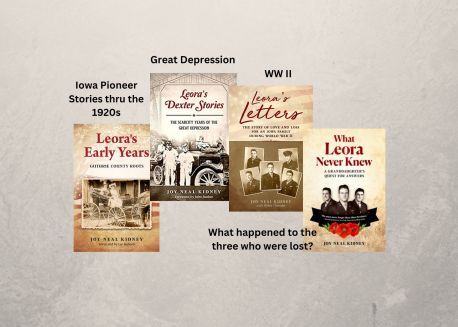Questions to Ponder: Leora’s Dexter Stories: The Scarcity Years of the Great Depression

A couple of book clubs have read Leora’s Dexter Stories, then gather to discuss it. One club read all three Leora books and voted this one their favorite. Here are questions at the end of this book to help start conversation about those Great Depression days:
Questions to Ponder
1. Leora was blessed by having the support system of family, even her parents and adult siblings living nearby. At what points in the story does she have to let go of a family member? How do those losses affect her? What does that say about her character?
2. Marilynne Robinson, through a character in her book Gilead, says, “It is a good thing to know what it is to be poor, and a better thing if you can do it in company.” Do you agree that it’s a good thing to know what it is to be poor?
3. A character in Willa Cather’s My Antonia says, “But, you see, a body never knows what traits poverty might bring out in ‘em.” Having lived through the challenges of 2020 (Covid-19, hurricanes, a derecho storm in the Midwest, an especially contentious election), what traits have those brought out in you?
4. In Song of the Lark, Willa Cather says, “The fear of the tongue, that terror of little towns. . . . “ If you’ve lived in a small town, what are the drawbacks? What about the benefits?
5. “. . .[T]he depression that began in 1929. . . came on harder and faster, it engulfed a larger part of the population, it lasted much longer, and it did far more and far worse damage than any before it.”
In Brother, Can You Spare a Dime, Melton Meltzer said that no one can understand America today without knowing something about the Great Depression of the 1930s. Even the lives of those who suffered through it are different because of that disaster, he said. “The deepest wounds of the depression were borne by children.”
Do you have family stories that have come down from those Great Depression years?
6. I’ve heard that people tend to collect or even hoard the things they missed out on as children. My mother Doris couldn’t have enough towels and sheets in the linen closet. She also collected dolls. Can you relate to this?
7. There have been times in our history where world events create such an undertow that it affects individual lives. Besides the Great Depression and Covid-19, can you think of other events that have been turning points in your own life?
8. “The way I see it,” says Billie Jo in Karen Kesse’s Newbery Medal Winner Out of the Dust, (one sentence from poetic lines) “hard times aren’t only about money, or drought, or dust. Hard times are about losing spirit, and hope, and what happens when dreams dry up.”
Which do you think is harder: poverty of material things or poverty of spirit?
Leora’s Dexter Stories is also available as an audiobook, done with Virtual Voice. You may listen to a sample of it below the book cover.



